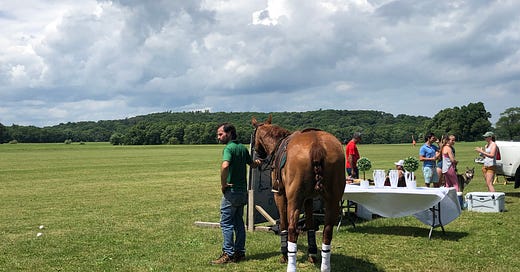Ode to a Polo Pony
Polo is one of the oldest equine sports. It was invented by warriors who were nomads in Central Asia. The nomads introduced the game to Persia (modern Iran) between 600 B.C. and 100 A.D. Soon after it was adapted by the nobility and military men. From there it spread to Turkey, China, Japan and India.
If you want to learn about polo, watch what happens off the field. You will see a string of ponies tied to a trailer waiting their turn.
Polo is somewhat like ice hockey. Instead of strapping on skates, you ride a pony. A match is divided into four or six periods called chukkers. These last 7 ½ minutes each on the clock or about 15 minutes if you include stoppage.
Since the ponies are running at full gallop to chase the ball, the players usually have three or four horses per player. There are horse changes during or in between a chukker. It is striking to watch these animals. If you watch closely, you will notice a polo pony is always conserving their energy. When not on the field, they stand quietly, almost making no fuss.
Note: the average polo stands around 15.1 hands, which is considered a horse not a pony.
The best polo ponies are fast, have stamina and are very agile. But there is something else that is not so noticeable. These ponies have a mental toughness. Often a polo pony will get nailed with a ball, a mallet or another horse. They don’t buck or rear. They continue to play.
Polo is a contact sport, like ice hockey, with fouls. Nonetheless, the horses have to deal with very unexpected incidents of contact. The players are focused on the ball and other players, not the pony. The pony is essentially a teammate of the rider.
Really, there are two games to watch in a polo match. There is the human game of polo. And then there is the ponies’ version of polo. They are similar but not completely the same.
The pony can care less if there is a goal or not. Yet, the pony understands the game and is tracking the ball, their rider, the other horses and other humans.
They can see more than a human, They can sense and feel more than a human. The polo pony is playing a game of respect. They would not be playing this game if not requested by the human. To the horse, there are no fouls. Only the human will call out the fouls.
Horses don’t compete against other horses. Of course, they may not like another horse but for them, there is no winner or loser.
Competition is a human construct, like time.
During the match that I watched and filmed, there was a moment of comic relief. A herd of loose cows ran onto the polo field. The game was stopped. The two referees while riding their ponies tried to chase the cows away.
The polo pony plays along.
If you want to learn more about the power and intelligence of a horse, you may find more about booking a lesson here.




